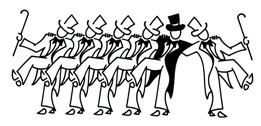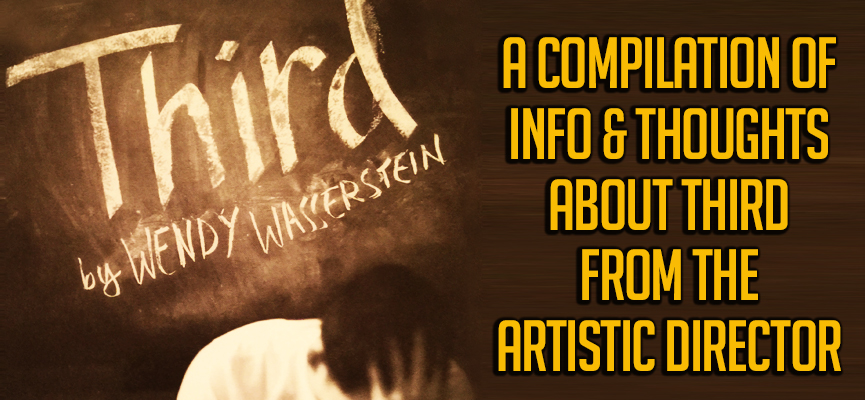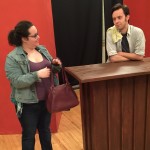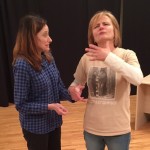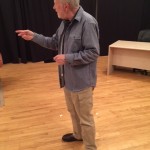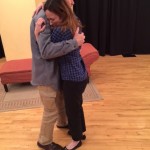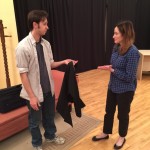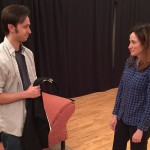In her short career, Wasserstein wrote 11 plays, three of which—Isn’t It Romantic, The Heidi Chronicles (for which she won a Tony Award, a Pulitzer Prize and a Susan Smith Blackburn Prize) and The Sisters Rosensweig—were produced by INDEPENDENT PLAYERS in past seasons. She has been called an author of “women’s identity crises.” Her heroines are “intelligent and successful but also riddled in self-doubt and sought enduring love ambivalently, but they did not always find it and their hard-earned sense of self-worth was often shadowed by the knowledge that American women’s lives continued to be measured by their success at capturing the right man.” Wendy Wasserstein is clearly an IP favorite!
Many critics have written that this is Wasserstein’s most personal play (which opened in 2005); one suspects it may have been strongly influenced by the fact that she was suffering from ill health (known only to her family and people in the theatre community) and was hospitalized with lymphoma in December 2005. She died January 30, 2006. I was fortunate to see THIRD (which I had heard about in 2005) when it was produced at the Guthrie Theater in Minneapolis in February-March 2008. It was a great production which I thoroughly enjoyed, and which left such a vivid impression on my mind that I was determined that IP should eventually produce it in Elgin. I suggested it to Larry when we were laying out the 2015-2016 Season, and he agreed to direct it. Seeing it has been a real thrill for me!
Here is a synopsis and commentary of the play by Casey Stangl, the director of the play at the Guthrie: “Set in 2002, Third is about Laurie Jameson, a proudly liberal 50ish English professor at a prestigious East Coast university. She’s a rock star in the world of academia, a charismatic woman who has broken through the glass ceiling and become a renowned teacher and scholar. But as she enters the ‘third phase’ of her life, she is filled with a vague anxiety, made all the more palpable by her uncertainty of the cause. The play takes place during the run up to the Iraq war and Laurie is extremely angry and frustrated by her government’s action and what she considers to be a free pass given to the government by the media. She’s also in the throes of menopause, complete with hot flashes, mood swings and nostalgia for Frankie Avalon. Her father is sinking into dementia, her husband is invisible and her youngest daughter is, in Laurie’s view, drifting.
“Into this stew enters Woodson Bull III, a student in Laurie’s fall class on Shakespeare, who goes by the nickname Third. Laurie takes an instant dislike to this boy, pegging him a ‘walking red state’, a privileged jock who is slumming in her class. When Third submits a brilliant paper on Shakespeare’s King Lear, Laurie immediately believes that he has plagiarized the paper and subsequently has him brought up before the university’s Committee of Academic Standards. It is precisely this labeling of Third that sets in motion the events of the play and starts Laurie on a journey in which she must learn to let go of her preconceived notions about life, people and herself in order to free herself from fear. Like all of us, Laurie possesses judgments and biases about people and events. And, like all of us, she does not believe herself to be prejudiced. In fact, she prides herself on her tolerance, inclusiveness and fierce defense of those whom society leaves behind. She trusts her instincts and ability to quickly size up any situation—and popular culture rewards her for that. For example, the recent bestselling book Blink by Malcolm Gladwell is all about learning to make decisions ‘in the blink of an eye’, to trust your internal judgments and act decisively.
“This very human tendency to place people and things into mental boxes reflects our attempt to control our increasingly chaotic and uncertain lives. But we do this at our peril. People are complex creatures. Each of us considers ourselves multifaceted. We hate being categorized by our gender or our job or political beliefs. Yet we do it to each other all the time. And most of the time we’re right—first impressions are often correct. But there’s that odd exception, that surprising person who defies our expectations and breaks out of the box we’ve put him/her in. The wise among us have their eyes and ears open to possibility and seek the whole truth, in all its complexities.”
I hope this expose which I have pulled together here will pique your interest to come out and see the show for yourself. There are only four performances left—Fridays and Saturdays May 20-21 and May 27-28, at 7:30 PM at the Elgin Art Showcase, 164 Division Street, Elgin. You may purchase tickets on this website (credit card) or you may purchase them at the door prior to each performance (cash or check only). For further information or reservations, call 847-697-7374.
